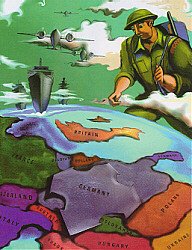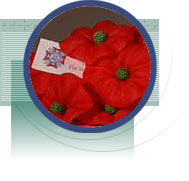In 1918, on the eleventh hour of the eleventh day in the eleventh month, the world rejoiced and celebrated. After four years of bitter war, an armistice was signed. The "war to end all wars" was over.
In 1921, an unknown World War I American soldier was buried in Arlington National Cemetery.
Similar ceremonies occurred earlier in England and France, where an unknown soldier was buried in each nation's highest place of honor (in England, Westminster Abbey; in France, the Arc de Triomphe).
These memorial gestures all took place on November 11, giving universal recognition to the celebrated ending of World War I fighting at 11 a.m..
Armistice Day officially received its name in America in 1926 through a Congressional resolution. It became a national holiday 12 years later by similar Congressional action. If the idealistic hope had been realized that World War I was "the War to end all Wars," November 11 might still be called Armistice Day. But only a few years after the holiday was proclaimed, war broke out in Europe.
Realizing that peace was equally preserved by veterans of WW II and Korea, Congress was requested to make this day an occasion to honor those who have served America in all wars. In 1954 President Eisenhower signed a bill proclaiming November 11 as Veterans Day.
A law passed in 1968 changed the national commemoration of Veterans Day to the fourth Monday in October. It soon became apparent, however, that November 11 was a date of historic significance to many Americans. Therefore, in 1978 Congress returned the observance to its traditional date.
Many countries celebrate their honored dead and veterans on this day.
This day is not to honor war, but the sacrifice made by others for our freedom.
FDR's Four Freedoms Speech 899 kb

In Flanders Fields
by Colonel John McCrae
In Flanders fields the poppies blow
Between the crosses, row on row,
That mark our place; and in the sky
The larks, still bravely singing, fly
Scarce heard amid the guns below
We are the dead. Short days ago
We lived, felt dawn, saw sunset glow,
Loved, and were loved, and now we lie
In Flanders fields.
Take up our quarrel with the foe
To you from failing hands we throw
The torch; be yours to hold it high.
If ye break faith with us who die
We shall not sleep, though poppies grow
In Flanders fields.
An explanation of the poem and significance of poppies is found Here


FLAG ETIQUETTE:
Here are some tips to make sure your tribute is a respectful one:
Display the flag only between sunrise and sunset on buildings and stationary flagstaffs. The flag may be displayed for twenty-four hours if illuminated in darkness.
Do not display the flag in inclement weather.
Whether displaying the flag vertically or horizontally, make sure the canton of stars is visible on the upper left-hand side.
Do not let the flag touch the ground.
An unusable flag that is damaged and worn and can no longer be displayed should be destroyed in a dignified way by burning.
When not on display, the flag should be respectfully folded into a triangle, symbolizing the tricorn hats worn by colonial soldiers in the Revolutionary War.

Thanks to All Veterans and their Families.
Jim